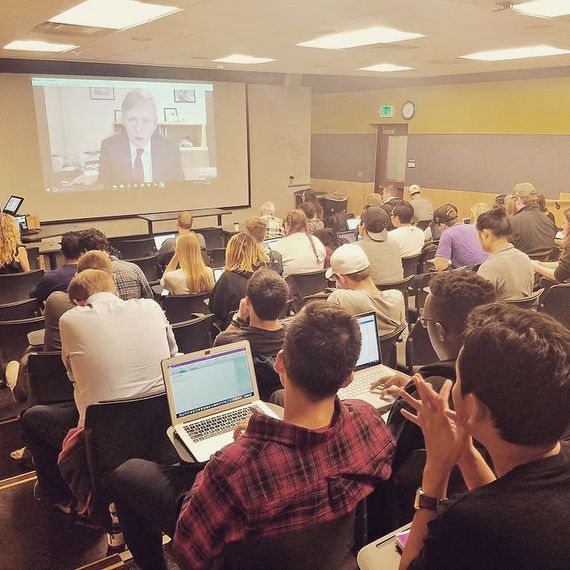International Education Week is an excellent opportunity to highlight the importance and benefits of global education and the value international cooperation brings to science.
In the past month, the embassy has hosted the Transatlantic Forum (formerly Transatlantic Science Week) in Chicago and a dinner in honor Dr. Allan Goodman, president of the Institute of International Education (IIE), who received the Royal Norwegian Order of Merit. At the dinner, Dr. Goodman and I discussed the importance of education both in addressing the migration crisis and in the fight against international terrorism.
During both of these events, I reflected on the vital links between people and education and research institutions in Norway and the United States. And how high the ambitions are for further strengthening these links.
The United States is Norway's most important partner on scientific research and higher education. Several of the world's best universities, as well as federally funded research centers, can be found here.
Obviously, this makes the United States a magnet for Norway's students, researchers and institutions.
The United States is by far the most popular destination for Norwegian exchange students. Including both exchange and full degree-seeking students, more than 3,500 young Norwegians are currently pursuing their studies at American universities. That means that roughly one out of 10 Norwegian graduate students studies in the U.S.
Norway is also experiencing an increasing number of American students attending our universities, where tuition is free and many courses are taught in English.
The university studies in Svalbard, for example, offer world-class courses in polar and ocean sciences at the world´s northernmost academic learning center.
Norwegian universities may be modest in size, and their names don't necessarily resonate globally. But they deliver results. Norway is ranked among the best five countries in the world according to a recent report called "Skills Matter." OECD, the Paris-based organization tested the practical information-processing skills of university graduates in all 34 OECD countries.
The report doesn't rate individual universities; instead, it measures the quality of a cross-section of national institutions of higher education, sorted by country.
In other words, the general quality of Norwegian universities is high, with little difference between the top and the bottom.
Offering world-class research facilities and centers for research-based innovation in a diverse number of areas, American universities have partnered with Norwegian ones and we welcome others to follow suit.
But why is it so important to partner with international institutions or encourage exchange programs?
The answer refers back to the conversation I had with Dr. Goodman on the role education must play in addressing some of the world's greatest challenges and in shaping the minds of future generations.
By working together and learning from each other, we prepare future leaders to make a difference by making the world a less dangerous place while further strengthening the already robust relations that exist between our two countries.
The Virtual Ambassador program I conduct at the Embassy is another way to collaborate with American universities. Through Skype, I speak to students about Norway's priorities and our unique expertise in areas of peace and reconciliation, girls' education and the Arctic, to name a few. This in turn increases awareness about Norway and the opportunities for student exchange and studying at our universities.
We can all agree that close links between the three pillars in the knowledge triangle - research, education and innovation - are keys for success.
To me, both scientific research and higher education are areas where we are looking toward the future. The young students of today will be the tomorrow's leaders. And today's research will provide the solutions to tomorrow's challenges - such as climate change, migration issues and the consequences of an aging population.
That is why we keep building these ever-stronger bonds.

